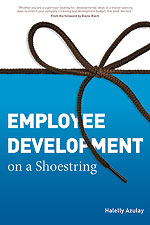ATD Blog
Project Belize: Volunteering as an Employee Development Tool
Thu Jul 02 2015

Volunteering involves providing your knowledge, skills, and abilities, as well as your time and energy, without establishing an employment relationship and usually without any monetary compensation. Employees who take on volunteer roles are able to build new skills and practice existing skills in a different setting from their day-to-day job.
Via volunteering, employees can try something different from their usual work, and bring back new skills to the workplace, thereby adding value to their employer by improving their current job performance. They may even enhance the succession management efforts of their employer, because they become ready to move into positions of greater responsibility faster and more effectively than they would have had they not taken on the volunteer role.
The best part about this employee development strategy is that it doesn't cost the organization nearly as much as sending the employee to costly training workshops or hiring a coach. In fact, it often costs the organization nothing.
In my ATD Press book, Employee Development on a Shoestring, I describe 11 different methods for developing employees outside the classroom. The chapter on volunteering explains:
who should try volunteering
how volunteer projects benefit learners and the organization
what competencies volunteering can develop
how to establish volunteer efforts.
The chapter concludes with a case study that depicts the success PricewaterhouseCoopers (PwC) enjoyed as a result of offering this type of development method.
PwC’s Project BelizeProject Belize, an initiative that partners PwC employees with schools in Belize City, is primarily focused on financial literacy and environmental sustainability. Specifically, some 200 PwC volunteers—partners, staff, and interns from across the United States—traveled to Belize City, Belize, in the summer of 2011. The PwC team connected with more than 1,200 students in 10 schools in some of Belize’s poorest areas and focused on hosting a youth financial literacy camp, leading a scholar's mentoring program for current and former Belizean students, providing financial and technology training to teachers.
According to the project’s website, “since its inception, \[they\] have contributed 30,000 pounds of school supplies, awarded approximately 765 high school equivalent scholarships so these students can continue their education, and delivered our financial literacy curriculum to 6,412 students with the help of 1,609 talented and enthusiastic PwC interns, partners, and staff.”
In addition, volunteers built “Learning Landscape” playgrounds using repurposed materials. PwC volunteer Justin Suissa explains that “the experience \[building learning landscape playgrounds\] was valuable on so many levels.” Suissa shares that he was out of his element—construction is not where his expertise lies. What’s more, the team had a tight deadline, as well as many pitfalls and unexpected obstacles to overcome. But clearly defined deliverables—build six playgrounds in five days for the children—helped the team pull together through pouring rain and intense heat and humidity.
Working through these challenges, says Suissa, helped him improve core leadership and teambuilding competencies. He describes how figuring out new technical skills in an unpredictable environment developed his flexibility and agility. “While I did not expect it, it was like a learning playground for us, the volunteers. With high stakes and a tough deadline, my teammates and I had to solve problems creatively and let go of pre-established hierarchies in this new environment.”
For another PwC volunteer-employee, Jack Teuber, this experience meant a change in his environment and operational mode. He went from working as a competent managing director who leads a team of experienced adults to a novice middle school teacher in a foreign country, working with children and a brand-new and mixed team of associates and interns.
Teuber understood that his challenge was “to get out of people’s way and encourage them to grow, solve problems, and develop their leadership skills.” Doing so helped him develop collaboration and coaching skills. In other words, he and his team cultivated their abilities to support the success of those working around him—building relationships, establishing empathy, communicating, and partnering. These skills are “extremely important back in the PwC environment because they help us serve our clients better and be better leaders and team players to our colleagues,” says Teuber.
Finally, he believes that the volunteer experience helped him gain tremendous partnering and networking benefits. According to Teuber, “The team members still keep in touch after returning home and all of us have developed greater access to and understanding of other areas of the business, which serves to break down barriers, especially the hierarchical ones. Belize affected my self-awareness and has caused me to want to do this for my own team \[at home\].”
Practical Application
While Project Beleize describes a large and generous company taking on a big expenditure, the same principles can be applied to any volunteering effort. Organizations can start volunteering projects in their local communities (no international flights needed) by sending either individual employees or workforce teams to connect with other members of the wider community on volunteer missions. The learning that took place for Project Belize volunteers could happen in your local neighborhood. I hope you give it a try!
Employee Development on a Shoestring provides plenty of additional tools, checklists, self-assessments, and other supports to help you implement the various development methods, consider some of the objections you might encounter, and outlines ways to overcome challenges. It’s a comprehensive tutorial for all managers, supervisors, trainers, human resources (HR) personnel, coaches, and other professionals who are involved in developing employee competence efficiently and cost-effectively.

More from ATD
